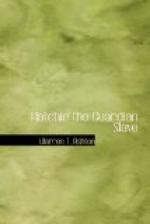Simple as this single point had before appeared, he found, on reflection, that it was environed with difficulties and dangers. Jaspar was intrenched in his own castle, and it would require some address even to approach near enough to hold a parley. Conclusive as were the evidences in his possession of Jaspar’s perfidy, they might, by the aid of cunning and gold, be made to appear as forgeries, gotten up for the purpose of extorting money. The stake was a great one, and he determined with a bold hand to play the game.
CHAPTER XXV.
“Cassius. At such a time as this, it is not meet That every nice offence should bear its comment. —You wrong me every way; you wrong me, Brutus!” SHAKSPEARE.
Jaspar Dumont, on the morning after the abstraction of the papers by Dalhousie, rose from his inebriated slumbers; but his rest was a misnomer. The strong excitement, which a few weeks before had served to keep his mind occupied, had now passed away. His villany was accomplished; but it had not purchased the satisfaction he coveted—it had cost too much sacrifice of soul. Brandy was his only solace; and even this only conjured up demons of torture in his fevered imagination.
He was conscious that on the previous night he had drank too much. There seemed to be a chasm in his recollection which all his efforts could not fill. He might, while in a measure unconscious of his actions, have betrayed some of his momentous secrets. The overseer, of whose presence he had an indistinct remembrance, might have obtained some further clue to the great mystery. These were annoying reflections, and while he resolved to be more temperate in future, how fervently he adjured his patron demon to ward off any danger he might have courted in his inebriation!
After his accustomed ride through the cane-fields, he retired to the library. The decanter had been replenished with brandy, and his late resolutions did not deter him from freely imbibing of its contents. The equilibrium was restored. His mind, stimulated by the fumes of the liquor, resumed its usual buoyancy. He paced the room, and drank frequent draughts of the fiery beverage.
Suddenly he stopped in his perambulation, as a faint recollection of the lost key came to his mind. He searched his pockets; but it could not be found. The drawer was locked. Suspicious as he was fearful, he trembled lest in his oblivious moments he had compromised his secret. He sent for the overseer, determined to know and provide for the worst.
After the messenger left, his reflections assumed a new direction. He tried to laugh away his suspicions, applied epithets to himself which it would not have been safe for another to have applied, and in good round oaths cursed his own stupidity. In his privacy he was a pattern of candor, and bestowed upon himself such a rating as, to another, would have given fair promise of good results.




